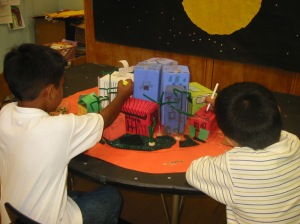
I was having a discussion with a colleague today about digital coping skills. It got me thinking about the difference between analog and digital coping skills, especially as they relate to teaching.
In my opinion, teachers are excellent at coping with a lot of issues. Nothing in a classroom ever goes exactly as planned, but you don't see teachers throwing up their hands and saying, "Forget it!" They deal with misbehaving kids, running out of paper, broken pencils, messy chalk, fire drills, spills, interruptions, and much more. These things rarely phase good teachers. They take it all in stride and continue on. In fact, to the casual observer, they might not even notice that anything had happened.
Why then, do so many of these same teachers seem to feel that technological mishaps are such huge roadblocks? Why are digital coping skills so different from "analog" coping skills? Is it that they require teachers to do some troubleshooting that they may not feel qualified to do? Is is that they require teachers to have a comfort level with technology that allows them to switch gears in the middle of a lesson without missing a beat?

So how do build digital coping skills? We can't possibly teach all teachers all aspects of technology. We may just need to build them on the go. When I first started teaching elementary school, I was afraid to do arts and crafts projects with my students. I worried about the mess that it would create. I worried about the time it would consume. I worried that I was not artistic enough to give good directions or model effectively. No one taught me how to be a better arts and crafts teacher. I just jumped in and started working with paint and glitter. I still don't really like it, but I did give my students an opportunity to do something outside my comfort zone. Over time, I learned how to organize arts and crafts lessons better to minimize the mess. I learned how to show them tricks to make the projects easier, even though I didn't really know how to do them well myself. I learned that many of my students benefited from the opportunity to express themselves in a way that was different from my own.
Digital coping skills aren't really that different from analog coping skills. It's just that we are so good at analog coping skills that we take them for granted. It is time for us to develop our digital coping skills.
Jump right in.
Ask for help.
Expect mistakes.
Most of all, remember that your students might find value in something, even if you aren't comfortable with it.
Photo Credits:
http://imaginemars2.jpl.nasa.gov/gallery/display/view.cfm?contactID=145&projID=134
Comments
Post a Comment